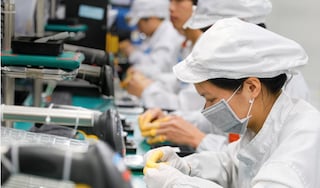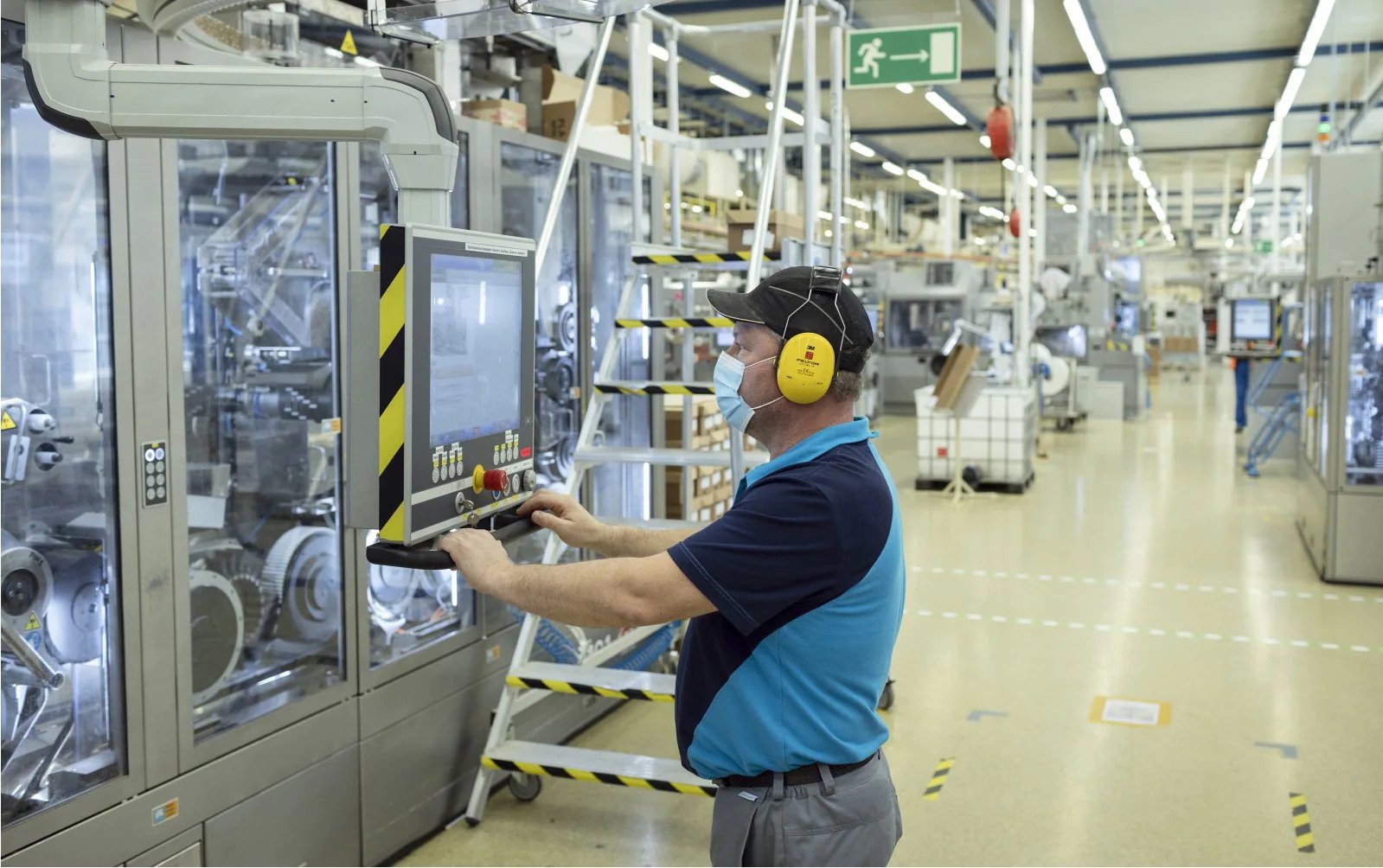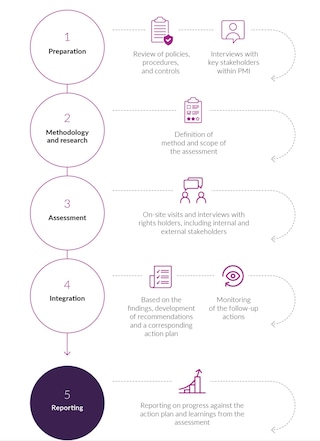Following the completion our first three human rights impact assessments in Mexico (2018), the Philippines (2019), and in Mozambique (2020), we partnered with experts at the respected consulting firm Article One to assess the impact of our business operations in Russia, our largest commercial market in the Eastern Europe Region. We chose Russia for our significant manufacturing footprint, the success of our transformation and market penetration of IQOS, as well as the cultural and ethnic diversity of a country that is part of both Europe and Asia. Additionally, digital expertise was a requirement in order to conduct the assessment virtually.
Objectives of the assessment:
- Surface potential human rights risks and opportunities before they turn into adverse human rights impacts;
- Assess the degree to which each human rights risk is managed by existing processes at PMI in Russia;
- Build action plan based on recommendations, enabling PMI to mitigate risks and maximize opportunities for positive impact; and
- Identify opportunities to live up to the company’s values and commitments in collaboration with business partners.
Adapting to a changing environment
Due to the COVID-19 pandemic, and the inability to travel and/or conduct in person meetings, we had to re-design elements of our human rights due diligence system to ensure that we continue to identify and address potential human rights risks and impacts (in accordance with PMI’s Human Rights Commitment). We therefore re-shaped our approach and performed this assessment virtually. While field visits and direct interactions are invaluable and will continue to be a core element of our due diligence going forward, in the second half of 2020, Article One conducted stakeholder interviews relying only on technological tools such as Microsoft Teams. Lessons learned in Russia will help us improve virtual engagement in the future, if needed. To compensate the lack of in-person interaction during the assessment, we took additional measures to be better prepared, including deeper engagement with the local management team to explain objectives and build robust action plans. A silver lining to this virtual exercise was that internal and external stakeholders - from non-profits to academia and business associations - spread out across Russia could connect with us from remote locations, thanks to the online format. This proved insightful given Russia’s range of geographies and potential risks.

We commend PMI for the company’s commitment to continue its global human rights due diligence program despite the challenges posed by the COVID-19 pandemic. While the pandemic and associated travel restrictions did not make it possible for us to conduct the assessment in country, the pandemic also heightens human rights risks, creating a more urgent need for human rights due diligence. While we hope to conduct the next market-level assessment in-country again, we are encouraged by the open and honest conversations we have been able to conduct virtually with employees, contracted workers, union representatives, and other key stakeholders.
Anatomy of the Human Rights Impact Assessment
The United Nations’ Guiding Principles on Business and Human Rights are a set of guidelines for governments and companies to prevent, address and remedy human rights abuses committed in business operations. They rest on three pillars: the state duty to protect human rights, the corporate responsibility to respect human rights, and access to remedy for victims of business-related abuses.
At PMI, in order to meet our responsibility to respect human rights, we have put in place policies and practices to promote and protect human rights, and further identify, prevent, mitigate and account for how we address our adverse human rights impacts. This includes human rights saliency mapping, risk assessments and impact assessments. The diagram below shows how an assessment occurs.
Participation in this independent assessment is an opportunity to reconfirm our transparent way of conducting business, showcase fair and equal opportunity treatment of our employees according to diversity and inclusion practices adopted by PMI Russia as well as evaluate external stakeholders' view on our sustainability practices.
Findings
Key strengths identified by employees in conversation with our human rights consultant:
- Above-average wages and benefits, strong business practices, workplace safety, professional development and growth, volunteer opportunities, and support during COVID-19.
- Consistently strong culture and pride among corporate and factory employees (echoing assessments in Mexico and the Philippines), including “speak-up culture” that hears employees’ concerns.
- Strong internal communications and coordination of PMI’s transition to remote work, as well as PMI’s protective measures and support which extend to contractors.
- Commitment to volunteering and charity, including chairing the National Volunteering Council. PMI’s program was the only corporate responsibility program mentioned in Russia’s National Sustainable Development Goals Report.
- Importance of the transition to reduced-risk products seen as key to PMI’s social impact and makes them proud to work for PMI.
- Strong ethics and compliance culture.
We have quite a strong safety culture. When we go outside (the company) we have a good reference, so when we see certain situations, we don´t accept them, try to assist and raise facts to push partners and contractors to be more secure and eco-friendly.
Key risks identified by stakeholders:
- Address employees’ job security fears especially in Krasnodar region where other industrial opportunities are limited.
- Strengthen freedom of association and workers’ voice to address concerns about declining membership of trade unions.
- Work with suppliers to further raise the standards for contractors’ wages and benefits.
- Address employee workload and stress due to additional priorities resulting from both PMI’s transformation and COVID-19 challenges. This echoes assessments in Mexico and the Philippines.
The DNA of this company is our lack of patience. You haven’t launched a project and they are already asking about results. It creates additional stress.
Opportunities for PMI to lead in the private sector in Russia:
- Business ethics: PMI’s strong compliance and “Speak up” culture could be leveraged to position PMI’s expertise by sharing lessons and challenges.
- Diversity & inclusion: There is an opportunity to apply PMI’s global leadership to contribute to the advancement of diversity & inclusion in Russia.
The results of the assessment are a valuable, unbiased instrument for further development of our corporate social responsibility strategy in Russia. We have already created three cross-functional working groups that analyzed the findings and recommendations and established a robust action plan.
Looking Ahead
Actions include strengthening training related to freedom of association, analyzing opportunities to raise standards for the third-party, on-premises workers (e.g., access to medical facilities) and enhancing communication on resilience and reasonable working time for all employees in the country. In addition, we plan to expand internally the scope of PMI’s diversity and inclusion strategy in order to position Russian affiliates as experts in diversity and inclusion for external business audiences. We will also continue systematic efforts to promote ethics and compliance among suppliers of Russian affiliates by conducting sustainability days at both factories and the Moscow head office. Lastly, we will continue to support Business Navigator – a program run in cooperation with the Russian Union of Industrials and Entrepreneurs to raise the level of responsible business practices among Russian small and medium enterprises.
Progress toward the deliverables will be consistently tracked and reported bi-annually to central functions. An update on achievements and challenges will be included in our 2021 Integrated Report.
Other case studies
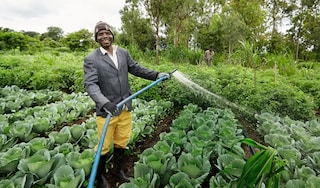
Working towards crop diversification
Read more
Early adopter market Japan
Read more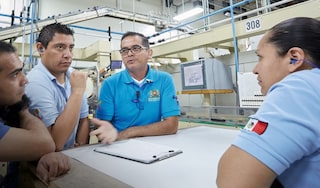
Human rights due diligence in Mexico
